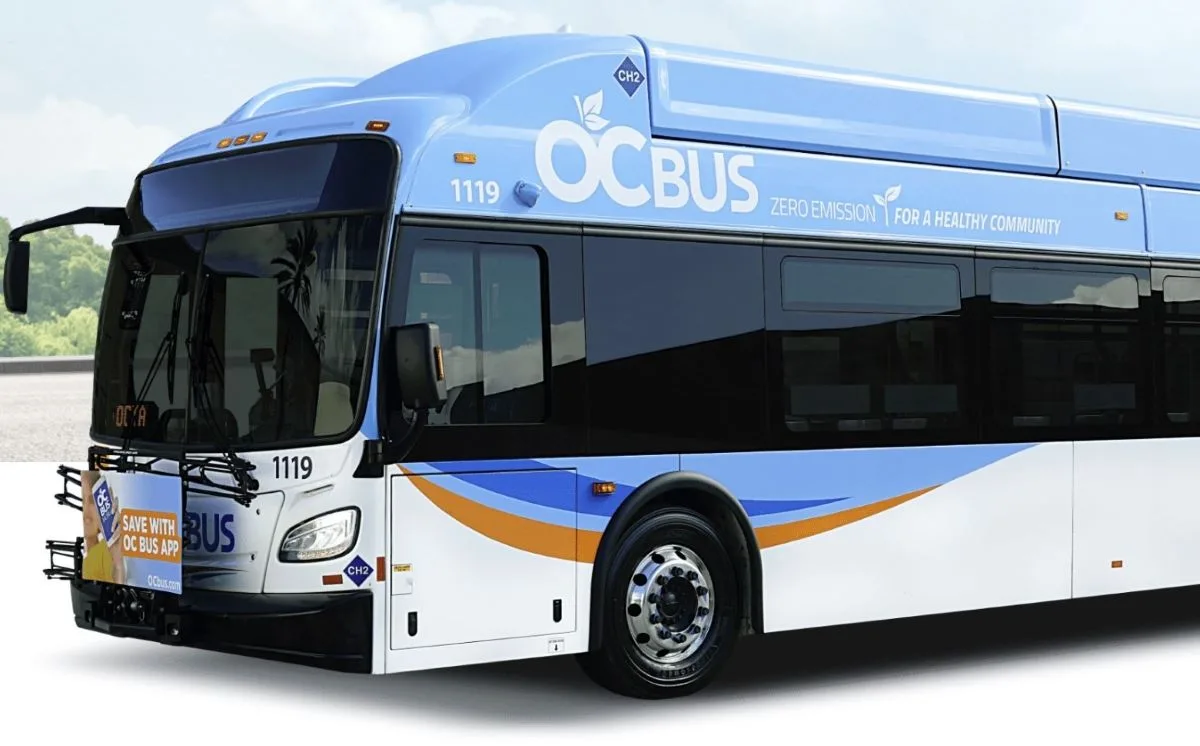ORANGE – In another important step toward a greener future, the Orange County Transportation Authority Board of Directors this week approved the purchase of 50 new zero-emission buses, marking a major milestone in an ongoing effort to transition the bus fleet to 100% zero-emission technology by 2040.
The purchase, unanimously approved by the board on Monday, Nov. 25, includes 40 hydrogen fuel-cell electric buses and 10 battery-electric buses, which will replace buses at the end of their useful lifespan that run on compressed natural gas.
While compressed natural gas is clean-burning and marked a dramatic shift away from the polluting diesel technology of generations past, both hydrogen and battery-electric buses produce no pollutants into the air.
“I’m proud that OCTA is an industry leader in transitioning to zero-emission technology,” said OCTA Chair Tam T. Nguyen. “And I’m glad we’re helping set the standard for a future in where our passengers can continue to count on reliable bus service while protecting our environment.”
The move toward zero-emission technology aligns with the California Air Resources Board’s (CARB) 2018 Innovative Clean Transit Rule, which mandates that all public transit agencies in California fully transition their bus fleets to zero-emission vehicles by 2040. Under the rule, 25% of new bus purchases must be zero-emission starting in 2023, increasing to 50% by 2026, and 100% by 2029.
New Flyer of America Inc., a leading manufacturer of zero-emission transit buses, was selected to provide the new buses. As part of the agreement, OCTA will purchase 40 of the 40-foot hydrogen fuel-cell electric buses and 10 of the 40-foot battery-electric buses.
All the new buses will be equipped with a full suite of technology and safety features, including video surveillance systems, reverse-motion cameras, fire and hydrogen detection systems, driver barriers, and electronic fare transaction devices.
As part of its Zero-Emission Bus (ZEB) Pilot Program, OCTA began testing both fuel-cell and battery-electric buses in 2020 and 2022, respectively. The pilot program has included 10 buses of each technology.
These pilot programs, which test each technology in real-life conditions on Orange County streets, have allowed OCTA to gain valuable operational and technological experience, helping to determine the most effective technology – or mix of technologies – to meet the needs of OC Bus riders.
FUNDING
While the cost of purchasing zero-emission technology required by the state is considerably more expensive than a standard compressed natural gas bus, OCTA is working to reduce costs and leverage funding to meet the state mandate.
The initial quote for the 40 hydrogen fuel-cell buses and 10 battery electric buses was estimated at $84.4 million. However, through strategic negotiations, including leveraging California’s zero-emission vehicle sales tax exemption, OCTA reduced the cost to $77.5 million – a savings of nearly $7 million.
The purchase will cost $63.6 million for the 40 hydrogen fuel-cell buses and $13.9 million for the 10 battery electric buses.
The funding for these buses is provided through a combination of Federal Transit Administration (FTA) funds and state funds from California Climate Investments, a statewide initiative that puts billions of Cap-and-Trade dollars to work reducing greenhouse gas emissions, strengthening the economy, and improving public health and the environment — particularly in disadvantaged communities.
ELECTRIC CHARGING STATIONS
To ensure the new buses can be sufficiently charged, the OCTA Board of Directors, in a separate action, also approved the purchase of 11 battery chargers.
Those chargers, which will cost $2.2 million, will be installed at OCTA’s bus base in Santa Ana, where the new battery electric buses will be fueled and maintained.
Currently, OCTA stations the 10 battery electric buses at its Garden Grove facility. The hydrogen fuel-cell buses are stationed at the Santa Ana base, which in 2020 debuted the nation’s largest hydrogen fuel tank.
The new buses are expected to hit the streets of Orange County in late 2026.
“This is a significant investment in the future of public transportation in Orange County,” said OCTA CEO Darrell E. Johnson. “We look forward to continuing to work with our state and federal partners to ensure we secure the necessary funding for an even cleaner transit future while continuing to improve the lives of our riders and communities through public transportation.”
About OCTA:
The Orange County Transportation Authority is the county transportation planning commission, responsible for funding and implementing transit and capital projects for a balanced and sustainable transportation system that reflects the diverse travel needs of the county’s 34 cities and 3.2 million residents. With the mission of keeping Orange County moving, this includes freeways and express lanes, bus and rail transit, rideshare, commuter rail and active transportation. To sign up for more OCTA news, visit octa.net/GetConnected.

